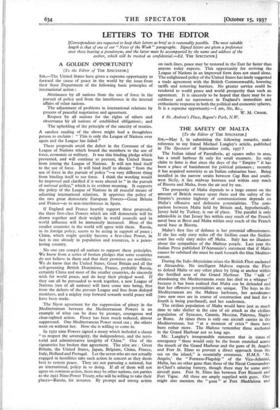LETTERS TO THE EDITOR
[Correspondents are requested to keep their letters as brief as is reasonably possible. The most suitable length is that of one of our "News of the Week" paragraphs. Signed letters are given a preference over those bearing a pseudonym, and the latter must be accompanied by the name and address of the author, which will be treated as confidential.—Ed. THE SPECTATOR.]
A GOLDEN OPPORTUNITY
[To the Editor of THE SPECTATOR.] SIR,—The United States have given a supreme opportunity to forward the cause of peace in the world by the issue from their State Department of the following basic principles of international action :
Abstinence by all nations from the use of force in the pursuit of policy and from the interference in the internal affairs of other nations.
The adjustment of problems in international relations by process of peaceful negotiation and agreement.
Respect by all nations for the rights of others and observance by all nations of established obligations; and The upholding of the principle of the sanctity of treaties.
A careless reading of the above might lead a thoughtless person to exclaim : "This is only the League of Nations over again and the League has failed."
These proposals avoid the defect in the Covenant of the League of Nations which bound the members to the use of force, economic or military. It was this binding pledge which prevented, and will continue to prevent, the United States from joining the League of Nations. It will not bind itself to the use of force. It will bind itself to abstain "from the use of force in the pursuit of policy "—a very different thing from binding itself to use force. I think the wording would be improved and clarified if it were altered to "in the pursuit of national policy," which is its evident meaning. It supports the policy of the League of Nations in all peaceful means of adjusting international relations. It approves the policy of the two great democratic European Powers—Great Britain and France—as to non-interference in Spain.
If England and France heartily support these proposals, the three first-class Powers which are still democratic will be drawn together and their weight in world councils and in world influence will be immensely increased. Most of the smaller countries in the world will agree with them. Russia, in its foreign policy, seems to be acting in support of peace ; China, which might quickly become a first-class Power, in fact is one already in population and resources, is a peace- loving country.
No one can compel all nations to support these principles. We know from a series of broken pledges that some countries do not believe in them and that their promises are worthless. We do know that the United States, Great Britain and all the self-governing British Dominions, France, probably Russia, certainly China and most of the smaller countries, do sincerely wish for world peace, and do keep thcir pledged word. If they can all be persuaded to work together, a new League of Nations (not of all nations) will have come into being, free from the defects of the present League and free from disloyal members, and a mighty step forward towards world peace will have been made.
The Nyon agreement for the suppression of piracy in the Mediterranean between the Mediterranean Powers is an example of what can be done by prompt, courageous and clear-sighted action. Piracy has been much reduced, almost suppressed. One Mediterranean Power stood out ; the others went on without her. Now she is willing to come in.
In 1922 nine Powers signed a treaty which included a clause " to respect the sovereignty, the independence, and the terri- torial and administrative integrity of China." One of the signatories has broken that agreement. The nine are : Great Britain, the United States, Japan, Belgium, China, France, Italy, Holland and Portugal. Let the seven who are not actually engaged in hostilities take such action in concert as they deem best to restore peace. They are not pursuing a national, but an international, policy in so doing. If all of them will not agree on common action, there may be other nations, not parties to the 1922 Nine-Power Treaty, who will be willing to take their placcs—Russia, for instance. By prompt and strong action
on such lines, peace may be restored in the East far faster than anyone today expects. This opportunity for reviving the League of Nations in an improved form does not stand alone. The enlightened policy of the United States has lately suggested a trade agreement with the British Commonwealth, lowering tariffs and removing barriers. No greater service could be rendered to world peace and world prosperity than such an agreement. It is sincerely to be hoped that there may be no coldness and no narrowness in England's immediate and enthusiastic response in both the political and economic spheres. It is a supreme opportunity.—I am, Sir, &c.,






















































 Previous page
Previous page